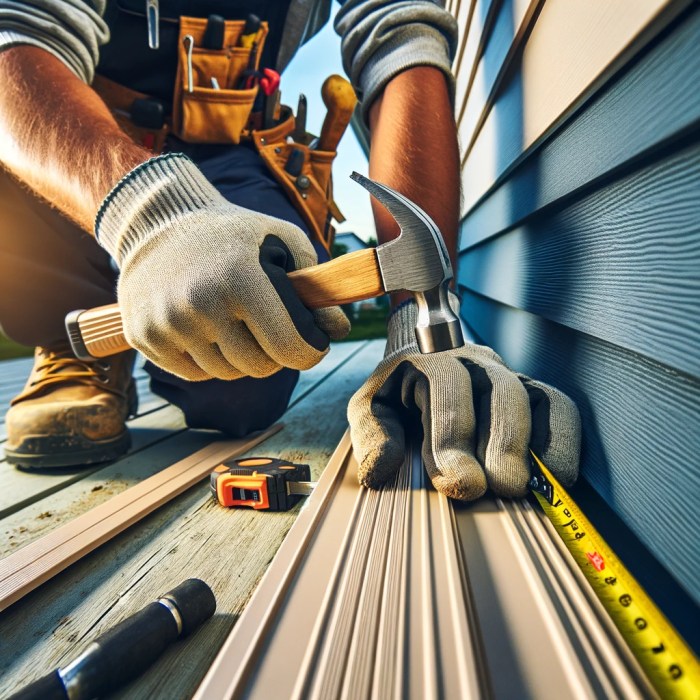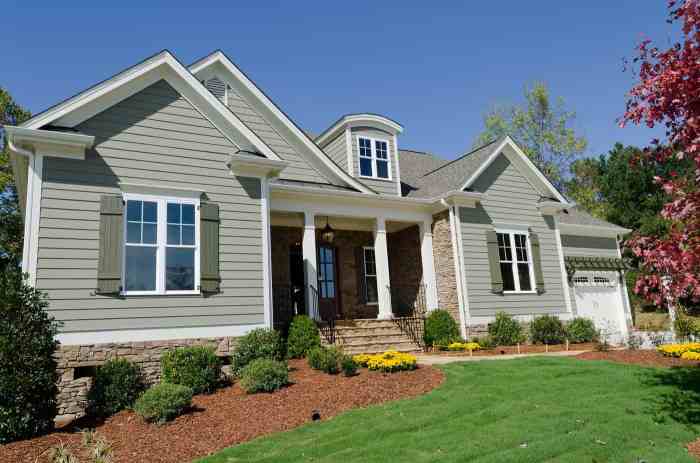Exploring Siding Contractors Near Me: Your Ultimate Guide
Embark on a journey into the world of siding contractors near me with this comprehensive guide that delves into the importance of hiring professionals for home improvement projects, the various types of siding materials, qualities to look for in reliable contractors, and cost factors to consider.
Learn about the benefits of local siding contractors, compare their services with DIY projects, and discover the aesthetic appeal of different siding materials for residential properties.
Research on Siding Contractors

When it comes to home improvement projects, hiring siding contractors can make a significant difference in the overall outcome. These professionals have the skills, experience, and tools necessary to ensure that your siding is installed or repaired correctly, saving you time and potential headaches down the road.
One of the key benefits of hiring local siding contractors is their familiarity with the specific needs and requirements of your area. Local contractors understand the climate, building codes, and common architectural styles, allowing them to provide tailored solutions that will enhance the look and durability of your home.
Services Offered by Siding Contractors vs. DIY Projects
- Quality of Work: Siding contractors have the expertise to deliver high-quality results that are built to last. DIY projects may lack the precision and durability that professionals can provide.
- Time and Convenience: Hiring siding contractors can save you time and effort, as they will handle all aspects of the project from start to finish. DIY projects often require a significant time commitment and may result in delays or mistakes.
- Cost-Effectiveness: While DIY projects may seem like a cost-effective option initially, the potential for errors and the need to invest in specialized tools can quickly add up. Siding contractors often have access to bulk pricing on materials and can complete the project efficiently.
- Warranty and Guarantees: Siding contractors typically offer warranties on their work, providing you with peace of mind and protection in case of any issues. DIY projects do not come with the same level of assurance.
Types of Siding Materials
When it comes to choosing siding materials for residential properties, there are several options available, each with its own unique characteristics and benefits.
- Vinyl Siding:Vinyl siding is a popular choice due to its affordability and low maintenance requirements. It is durable, resistant to rot and insect damage, and comes in a wide range of colors and styles.
- Fiber Cement Siding:Fiber cement siding is known for its durability and resistance to fire, termites, and moisture. It can mimic the look of wood or stucco, offering a high-end appearance with minimal maintenance.
- Wood Siding:Wood siding provides a natural and classic look to a home. Cedar and redwood are popular choices due to their natural resistance to decay and insects. However, wood siding requires regular maintenance, such as painting or staining, to prevent rot and deterioration.
- Aluminum Siding:Aluminum siding is lightweight, durable, and easy to install. It is resistant to rust and corrosion, making it a good option for coastal areas. However, aluminum siding can dent easily and may require repainting over time.
- Brick Siding:Brick siding offers a timeless and elegant appearance to a home. It is highly durable, energy-efficient, and requires minimal maintenance. However, brick siding can be expensive to install compared to other materials.
Durability and Maintenance Requirements
When considering siding materials, it is important to factor in the durability and maintenance requirements to ensure the longevity and upkeep of your home's exterior.
- Vinyl Siding:Vinyl siding is durable and requires minimal maintenance, such as occasional cleaning with soap and water. It can last up to 30 years with proper care.
- Fiber Cement Siding:Fiber cement siding is highly durable and low maintenance, requiring only periodic painting or caulking to maintain its appearance. It can last up to 50 years or more.
- Wood Siding:Wood siding is prone to rot and insect damage if not properly maintained. Regular painting or staining every few years is necessary to protect the wood and prolong its lifespan.
- Aluminum Siding:Aluminum siding is durable but can dent easily. It may require repainting every 5-10 years to maintain its appearance and protect against corrosion.
- Brick Siding:Brick siding is extremely durable and requires minimal maintenance. Periodic cleaning and inspections for mortar cracks are recommended to ensure its longevity.
Aesthetic Appeal
The aesthetic appeal of siding materials plays a significant role in enhancing the curb appeal and overall look of a residential property.
- Vinyl Siding:Vinyl siding offers a wide range of colors and textures to choose from, allowing homeowners to customize the look of their homes. It is versatile and can mimic the appearance of wood, stone, or other materials.
- Fiber Cement Siding:Fiber cement siding can replicate the look of wood, stucco, or masonry, providing a high-end appearance with added durability. It offers a clean and modern aesthetic to homes.
- Wood Siding:Wood siding exudes a natural and rustic charm, adding warmth and character to a home. It can be stained or painted in various colors to achieve a desired look.
- Aluminum Siding:Aluminum siding comes in a range of colors and finishes, offering a sleek and modern appearance to homes. It can complement contemporary architectural styles.
- Brick Siding:Brick siding provides a timeless and elegant look to homes, adding a sense of permanence and sophistication. It can enhance the overall aesthetic of traditional or colonial-style properties.
Qualities of Reliable Siding Contractors
When looking for siding contractors, it's essential to consider certain qualities that indicate their reliability and professionalism. Here are some key characteristics to look for:
Experience and Expertise
One of the most important qualities in a siding contractor is their level of experience and expertise in the field. Look for contractors who have a proven track record of successfully completing similar projects and who have a deep understanding of different siding materials and techniques.
Reputation and References
Before hiring a siding contractor, it's crucial to check their reputation and ask for references from past clients. A reliable contractor will have positive reviews and satisfied customers who can vouch for the quality of their work.
Licenses and Insurance
It's vital to verify that the siding contractor you choose is licensed and insured. A valid license ensures that the contractor has met all the necessary requirements to operate legally, while insurance protects you in case of any accidents or damages during the project.
Cost Factors and Estimates

When it comes to siding installation, the cost can vary depending on several factors. Understanding these factors and knowing how to obtain accurate estimates can help you budget and finance your siding project effectively.
Factors Influencing the Cost
- The size of your home: Larger homes will require more materials and labor, leading to higher costs.
- The type of siding material: Different materials come at different price points, with some being more expensive than others.
- The complexity of the installation: If your home has unique architectural features or requires intricate installation, the cost may be higher.
- Location: Labor costs and material prices can vary depending on where you are located geographically.
- Additional services: Any extra services such as removing old siding or repairing damaged areas can add to the overall cost.
Obtaining Accurate Estimates
- Get multiple quotes: Reach out to several siding contractors in your area to compare prices and services.
- Provide detailed information: Be specific about your requirements and the condition of your home to ensure accurate estimates.
- Ask for a breakdown: Request a detailed breakdown of costs for materials, labor, and any additional services to understand where the money is going.
- Ask about warranties: Inquire about warranties on materials and labor to factor in long-term costs and benefits.
Budgeting and Financing Strategies
- Set a realistic budget: Determine how much you can afford to spend on your siding project and stick to it.
- Explore financing options: Look into financing solutions such as loans or payment plans offered by siding contractors to manage costs effectively.
- Plan for unexpected expenses: Leave room in your budget for unexpected costs that may arise during the installation process.
Final Conclusion
In conclusion, siding contractors near me play a crucial role in enhancing the beauty and functionality of your home. By prioritizing qualities, materials, and costs, you can make informed decisions when selecting the right contractor for your project.
Question Bank
What are the benefits of hiring local siding contractors?
Local siding contractors offer personalized services, quick response times, and better knowledge of local regulations and climate conditions.
How can I verify the credibility of siding contractors?
Check for licenses, insurance, online reviews, and ask for references to ensure the reliability and experience of siding contractors.
What factors influence the cost of siding installation?
The size of the project, choice of materials, complexity of the design, and additional services required can impact the overall cost of siding installation.




